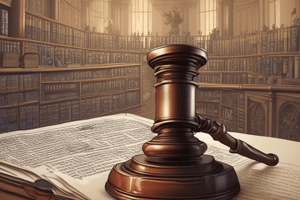Podcast
Questions and Answers
What are the three branches of Parliament?
What are the three branches of Parliament?
- The Supreme Court, the House of Commons, and the Monarch
- The Supreme Court, the House of Lords, and the Monarch
- The House of Commons, the House of Lords, and the Privy Council
- The House of Commons, the House of Lords, and the Monarch (correct)
What are the two types of domestic legislation?
What are the two types of domestic legislation?
- Devolved legislation and primary legislation
- Public legislation and private legislation
- Primary legislation and secondary legislation (correct)
- Statutory instruments and byelaws
What is the most authoritative source of law in the UK?
What is the most authoritative source of law in the UK?
- Statutes (correct)
- Custom and convention
- Common law
- Byelaws
What is the most common instrument for implementing change within the UK?
What is the most common instrument for implementing change within the UK?
Parliament can create, amend, or remove any piece of legislation it desires.
Parliament can create, amend, or remove any piece of legislation it desires.
Parliament can be questioned by any individual or body, most specifically the courts.
Parliament can be questioned by any individual or body, most specifically the courts.
Parliament is not bound by its predecessors and cannot bind its successors.
Parliament is not bound by its predecessors and cannot bind its successors.
Which of the following is an example of a public Bill?
Which of the following is an example of a public Bill?
Which of the following is an example of a private Bill?
Which of the following is an example of a private Bill?
Which of the following is an example of a codifying statute?
Which of the following is an example of a codifying statute?
Which of the following is an example of a consolidating statute?
Which of the following is an example of a consolidating statute?
Statutory instruments are now the most common form of legislation in the UK.
Statutory instruments are now the most common form of legislation in the UK.
Orders in Council are a form of primary legislation.
Orders in Council are a form of primary legislation.
What is the most common mistake made by students when referring to sources of law?
What is the most common mistake made by students when referring to sources of law?
What are the three most prominent factors leading to ambiguity and difficulty in the meaning of a statute?
What are the three most prominent factors leading to ambiguity and difficulty in the meaning of a statute?
What are the four questions that should be asked to ascertain the mischief of a particular statute?
What are the four questions that should be asked to ascertain the mischief of a particular statute?
The golden rule requires courts to apply the natural and ordinary meaning of statutory words.
The golden rule requires courts to apply the natural and ordinary meaning of statutory words.
The golden rule only applies if it will produce absurdity or a repugnant situation.
The golden rule only applies if it will produce absurdity or a repugnant situation.
The purposive approach is merely a more modern version of the mischief rule.
The purposive approach is merely a more modern version of the mischief rule.
What are the three tools used to help courts resolve ambiguity in statutory interpretation?
What are the three tools used to help courts resolve ambiguity in statutory interpretation?
The Pepper v Hart rule allows the use of Hansard to provide a more complete understanding of a statute.
The Pepper v Hart rule allows the use of Hansard to provide a more complete understanding of a statute.
The R v A (Complainant's Sexual History) case is a good example of how legislation can be read down in order to ensure that the interpretation is compatible with the Human Rights Act 1998.
The R v A (Complainant's Sexual History) case is a good example of how legislation can be read down in order to ensure that the interpretation is compatible with the Human Rights Act 1998.
Flashcards
What is Domestic Legislation?
What is Domestic Legislation?
The most authoritative source of law created by Parliament, consisting of the House of Commons, the House of Lords, and the Monarch.
What is Primary Legislation?
What is Primary Legislation?
Primary legislation is the highest form of UK law, also known as Acts of Parliament or statutes. It directly creates laws on a variety of subjects.
What is Secondary Legislation?
What is Secondary Legislation?
Secondary legislation is created by bodies authorized by Parliament to implement changes. It's often used for specific details or adjustments to existing laws.
What are Public Bills?
What are Public Bills?
Signup and view all the flashcards
What are Private Bills?
What are Private Bills?
Signup and view all the flashcards
What are Hybrid Bills?
What are Hybrid Bills?
Signup and view all the flashcards
What is Consolidating Legislation?
What is Consolidating Legislation?
Signup and view all the flashcards
What is Codifying Legislation?
What is Codifying Legislation?
Signup and view all the flashcards
What is Parliamentary Supremacy?
What is Parliamentary Supremacy?
Signup and view all the flashcards
What is the Positive Limb of Parliamentary Supremacy?
What is the Positive Limb of Parliamentary Supremacy?
Signup and view all the flashcards
What is the Negative Limb of Parliamentary Supremacy?
What is the Negative Limb of Parliamentary Supremacy?
Signup and view all the flashcards
What is Continuing Sovereignty?
What is Continuing Sovereignty?
Signup and view all the flashcards
What is the Impact of the European Communities Act 1972?
What is the Impact of the European Communities Act 1972?
Signup and view all the flashcards
What is the Impact of the Human Rights Act 1998?
What is the Impact of the Human Rights Act 1998?
Signup and view all the flashcards
What is Judicial Review?
What is Judicial Review?
Signup and view all the flashcards
What is Ultra Vires?
What is Ultra Vires?
Signup and view all the flashcards
What are Acts of Parliament?
What are Acts of Parliament?
Signup and view all the flashcards
What is the Legislative Procedure for Bills?
What is the Legislative Procedure for Bills?
Signup and view all the flashcards
What are Government Bills?
What are Government Bills?
Signup and view all the flashcards
What are Private Members' Bills?
What are Private Members' Bills?
Signup and view all the flashcards
What is a White Paper?
What is a White Paper?
Signup and view all the flashcards
What is a Green Paper?
What is a Green Paper?
Signup and view all the flashcards
Who drafts Bills?
Who drafts Bills?
Signup and view all the flashcards
What is the First Reading?
What is the First Reading?
Signup and view all the flashcards
What is the Second Reading?
What is the Second Reading?
Signup and view all the flashcards
What is the Committee Stage?
What is the Committee Stage?
Signup and view all the flashcards
What is the Report Stage?
What is the Report Stage?
Signup and view all the flashcards
What is the Third Reading?
What is the Third Reading?
Signup and view all the flashcards
What are the Parliament Acts?
What are the Parliament Acts?
Signup and view all the flashcards
What is Royal Assent?
What is Royal Assent?
Signup and view all the flashcards
Study Notes
Sources of Law I: Domestic Legislation
- Domestic legislation is created by Parliament, which consists of the House of Commons, the House of Lords, and the Monarch
- Domestic legislation is the most authoritative source of law, largely unchallengeable by courts
- Courts can interpret legislation if it's unclear or ambiguous
- Legislation is divided into primary and secondary legislation
- Primary legislation are Acts of Parliament (statutes) covering various laws like criminal, land, contract law etc.
- Secondary legislation (delegated/subordinate legislation) implements change through bodies like Privy Council, ministers, local authorities, and regulatory agencies
- Parliament may delegate powers through Acts of Parliament
- The European Communities Act 1972 and the Human Rights Act 1998 have significantly impacted domestic legislation
- The impact of these laws may be questioned in the light of Brexit
- Legislation in England and Wales
- Parliamentary supremacy: Parliament is the supreme law-making body, and power to create laws has been given to Parliament instead of the Monarch
- Pre-eminence of legislation: The major part of laws in England and Wales are now covered by legislation passed by Parliament. Case law (common law) was the most significant source of law in the past
- Statutes and Acts of Parliament are interchangeable terms
- Statutes are not standardized and can vary significantly in length (e.g. Theft Act 1978 has only 7 sections whereas Companies Act 2006 has 1,300 sections)
- Primary legislation: -Acts of Parliament -Statutory instruments -Procedural rules -Byelaws -Orders in Council -Royal Prerogative -Custom and conventions.
- Types of Legislation: -Public: affecting the public as a whole (e.g., European Communities Act 1972) -Private: concerning a specific person or body requiring parliamentary authority -Hybrid: a mix of public and private Bills affecting both (e.g., High Speed Rail Act 2017)
- Consolidation: re-enacting law contained in numerous statutes into a single statute (e.g., Equality Act 2010 combines other Acts)
- Codification: placing common law into statutory footing (e.g., changing common law based legislation into codified statute legislation)
- UK vs Devolved Legislation: The presumption that primary legislation applies solely to England and Wales unless a statute states otherwise
- Parliamentary Supremacy (Sovereignty): Parliament has the ultimate power to create or abolish any law. -The Positive Limb: Parliament can make any law it wants. -The Negative Limb: No person or body can override or set aside Parliament's legislation.
- Effect of EU Law: The UK's membership in the EU and acceptance of EU law, subjected UK law to EU law (s2(1) ECA 1972), potentially impacting parliamentary sovereignty slightly.
- Effect of Human Rights Act: Legislation must be compatible with Convention rights whenever possible (s3 HRA 1998 ); courts can declare legislation incompatible (s4) but cannot strike down primary legislation.
- Judicial Review: Courts can effectively challenge secondary legislation but not primary legislation
- Legislative Process: -Bills begin as proposals in the government -White and Green Papers: inform public consultation before a bill is introduced -Bill goes through the House of Commons, House of Lords stages (First Reading, Second Reading, Committee Stage, Report Stage, Third Reading, and Royal assent). -Parliament Acts: Process allows for bypassing the House of Lords' approval for certain bills
- British Railway Board v Pickin (1974): establishing that Acts of Parliament aren't subject to judicial review
- Ex parte Factortame (No. 2) (1991): provides an exception, for cases where statutes are inconsistent with EU law
- Legislative process, Parliament Acts 1911 and 1949, EVEL (English Votes for English Laws)
- Statutory instruments (secondary legislation, procedural steps of making), Statutory rules, Byelaws, and orders in council
- Judicial Review
- Rules of Construction
- Rules of Language (Ejusdem Generis, Noscitur a Sociis, Expressio Unius Est Exclusio Aliterius)
- Intrinsic Aids to Interpretation
- Extrinsic Aids to Interpretation
- Presumptions (interpretations of words and the intent behind legislation)
- Impact of the Human Rights Act 1998
- Key cases (R v Miller v The Prime Minister [2019] UKSC 41, Pepper v Hart [1993] AC 593 etc.)
- Key debates (regarding the literal rule, presumptions, etc.)
- Exam questions (essay and problem-style)
- Online resources for further study
Studying That Suits You
Use AI to generate personalized quizzes and flashcards to suit your learning preferences.




